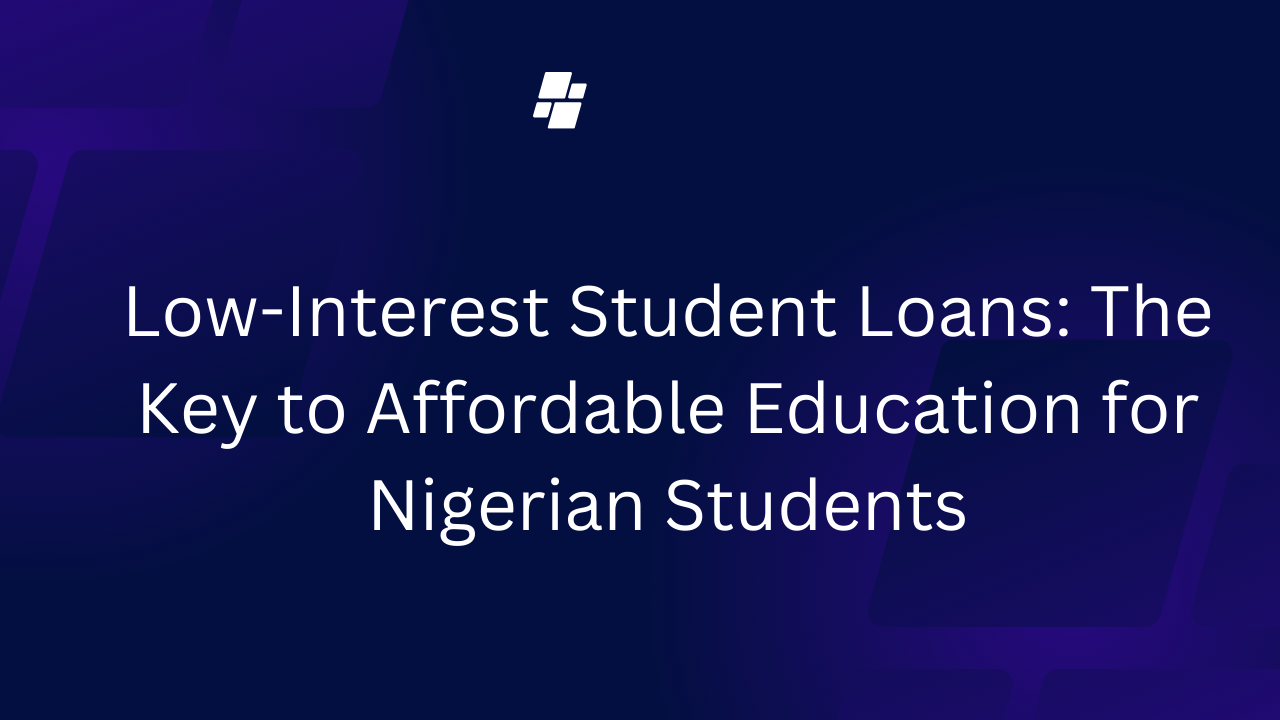Pursuing higher education in Nigeria or abroad can be a significant financial undertaking. For many Nigerian students, the costs of tuition, books, accommodation, and other related expenses present a challenge. Low-interest student loans provide a practical and accessible solution to bridge this financial gap, enabling students to pursue their academic goals without the heavy burden of high-interest debt.
In this comprehensive guide, we’ll explore the benefits of low-interest student loans, the top providers in Nigeria, tips for choosing the right loan, and frequently asked questions to help you make informed financial decisions.
Why Low-Interest Student Loans Matter
Low-interest student loans are specifically designed to make education more affordable and accessible. These loans often have lower interest rates than conventional personal loans, making them a popular choice for students.
Benefits of Low-Interest Student Loans
- Cost Savings: Lower interest rates reduce the total amount repaid over the life of the loan.
- Flexible Repayment Options: Many providers offer grace periods, allowing students to start repaying after graduation when they are financially stable.
- Access to Quality Education: Students can focus on their studies without constant financial worries.
Top Providers of Low-Interest Student Loans in Nigeria
Several reputable financial institutions in Nigeria offer low-interest student loans. Here’s an overview of the leading providers:
1. Access Bank Student Loan
Access Bank provides a student loan product tailored to meet the financial needs of students pursuing higher education locally or internationally.
- Eligibility: Open to Nigerian students enrolled in recognized institutions.
- Interest Rate: Competitive and lower than standard loan rates.
- Loan Amount: Based on the course and institution.
- Repayment Terms: Flexible options, with some plans allowing repayment after graduation.
2. First Bank Education Loan
First Bank offers an education loan designed to reduce financial barriers for students.
- Eligibility: Nigerian students admitted to accredited institutions.
- Interest Rate: Low-interest rates with no hidden charges.
- Loan Amount: Covers tuition and related expenses.
- Repayment Plan: Flexible and tailored to students’ post-graduation financial circumstances.
3. GTBank Student Loan
GTBank’s student loan is ideal for students seeking an affordable financing solution.
- Eligibility: Open to Nigerian students in recognized programs.
- Interest Rate: Competitive rates lower than many personal loans.
- Loan Amount: Sufficient to cover various educational expenses.
- Repayment Terms: Deferred repayment options available for post-graduation.
4. Stanbic IBTC Education Loan
Stanbic IBTC’s education loan caters to students needing accessible and affordable funding.
- Eligibility: Students admitted to accredited institutions.
- Interest Rate: Reduced rates to ease the burden of repayment.
- Loan Amount: Flexible, based on individual needs.
- Repayment Options: Includes grace periods and customizable terms.
5. NELFund Nigeria Educational Loan Fund
NELFund specializes in offering loans tailored for students.
- Eligibility: Available for Nigerian students in local or international institutions.
- Interest Rate: Competitive and affordable.
- Loan Amount: Determined by the applicant’s financial requirements.
- Repayment Terms: Flexible plans to match students’ post-graduation incomes.
Tips for Choosing the Right Student Loan
- Compare Interest Rates: Look for the lowest rates to minimize your repayment burden.
- Assess Repayment Options: Choose loans with grace periods or income-based repayment plans for flexibility.
- Verify Loan Coverage: Ensure the loan amount covers all educational costs, including tuition, books, and accommodation.
- Check Eligibility Requirements: Confirm you meet the criteria before applying.
- Evaluate the Application Process: Opt for providers with a streamlined and transparent process.
Alternative Financial Aid Options
In addition to low-interest loans, students should explore other financial aid options to minimize borrowing:
- Scholarships and Grants: These do not require repayment and are available for students who meet academic or need-based criteria.
- Work-Study Programs: Allows students to earn income while studying, reducing their financial reliance on loans.
- Family Contributions: Financial support from family can help reduce the amount you need to borrow.
Frequently Asked Questions (FAQ)
1. What is a low-interest student loan?
A low-interest student loan is a financial product designed to help students cover educational expenses with reduced interest rates compared to traditional loans.
2. Who can apply for a low-interest student loan in Nigeria?
Eligible applicants typically include Nigerian students enrolled in accredited institutions locally or abroad. Specific criteria may vary by provider.
3. How can I apply for a student loan in Nigeria?
- Visit the provider’s branch or website.
- Complete the application form.
- Submit required documents, such as admission letters, ID, and guarantor details.
- Wait for approval.
4. Are there any hidden fees with these loans?
Reputable providers, like Access Bank and GTBank, are transparent about fees. Always review loan terms to ensure there are no hidden charges.
5. When do I start repaying the loan?
Many loans offer a grace period, allowing you to begin repayment after graduation or once you start earning an income.
6. What happens if I miss a repayment?
Missed payments may lead to penalties or affect your credit score. Contact your loan provider immediately to discuss options if you anticipate payment difficulties.
7. Can I use the loan for international studies?
Yes, many providers, including NELFund and Access Bank, offer loans for students pursuing education abroad.
8. Are scholarships better than loans?
Scholarships are preferable because they do not require repayment. However, loans are a reliable option if scholarships are insufficient to cover your expenses.
Conclusion
Low-interest student loans are a vital tool for Nigerian students pursuing higher education locally or internationally. By comparing options from top providers like Access Bank, GTBank, and NELFund, students can find affordable solutions tailored to their needs. Additionally, exploring scholarships, work-study programs, and family contributions can further alleviate financial pressures.
With careful planning and informed decisions, you can secure the funding needed to achieve your academic and career goals. Start your journey today and take control of your future!
